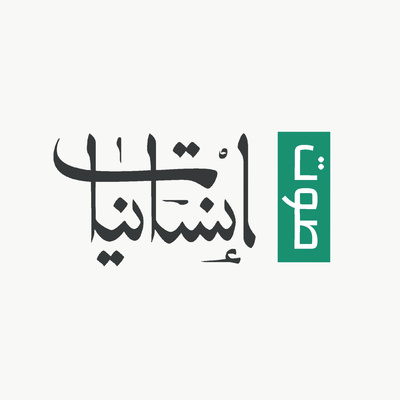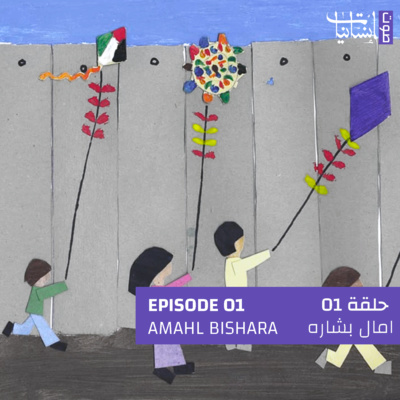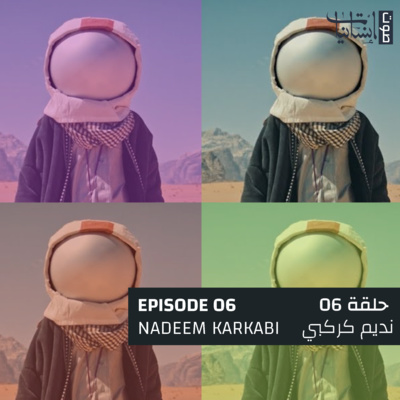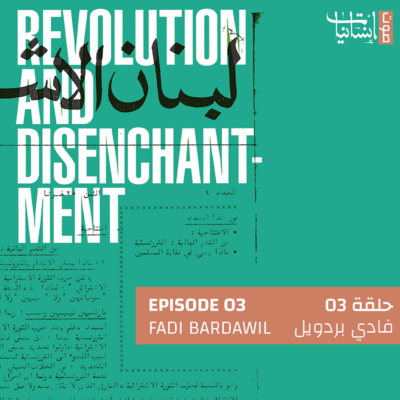
Voice of Insaniyyat | صَوت إنْسانيّات
By Voice of Insaniyyat | صَوت إنْسانيّات

Voice of Insaniyyat | صَوت إنْسانيّاتDec 04, 2020

6 | Nadeem Karkabi | نديم كركبي
Nadeem Karkabi is Assistant Professor of Anthropology at the University of Haifa, who studies Palestinian performative culture, and the interrelations between language, race, religion, and nationalism among Mizrahi Jews who perform Arabic music in Israel. In this episode, Aamer Ibraheem invites Karkabi to reflect on his relations to the anthropological field as an ethnographer who spent many years traveling between 48 Palestine, the West Bank, Amman, Berlin, London, and elsewhere in the world researching the alternative Palestinian music scene and the ways it helped forge different modes of solidarity and national belonging. They also discussed the significance of Palestinian cultural production, its aesthetics, and the different relations this production has to national and cosmopolitan features. Karkabi shares key insights from his current project on the working of culture and politics in the demarcation of the boundaries of Jewish collective in Israel and the way they challenge official state laws that safeguard its privileges. As a lecturer supervising university students, Karkabi spoke to us about the current trends and questions being invoked and unpacked by Palestinian students in the field of anthropology.
References:
Karkabi, Nadeem. 2016. Neither Heroes Nor Victims: Politics of Pleasure, Ethics of Resistance and Defiant-playful Subjectivities in the Palestinian Alternative Music Scene in Israel and the West Bank. [PhD Dissertation]. University of London, School of Oriental and African Studies.
--------------- . 2018. Electro Dabke: Performing Cosmopolitan-Nationalism and Borderless Humanity. Public Culture, 30(1), pp. 173-196.
--------------- . 2018. How and Why Haifa Has Become the “Palestinian Cultural Capital” in Israel. City & Community, 17(4), pp. 1168-1188.
--------------- . 2019. Arabic Language among Jews in Israel and the New Mizrahi Zionism: Between Active Knowledge and Performance. Journal of Levantine Studies, Vol. 9 No. 2, pp. 81-106.
--------------- . 2020. Self-Liberated Citizens: Unproductive Pleasures, Loss of Self, and Playful Subjectivities in Palestinian Raves. Anthropological Quarterly, pp. 679-708.
--------------- . 2021. The impossible quest of Nasreen Qadri to claim colonial privilege in Israel. Ethnic and Racial Studies, pp. 1-21.
Photo Courtesy: https://www.matatu.co/routes/47soul
Music:
Oya Marhaba, by TootArd
Al Shatea’, Rah Nibni Madeeneh (We Shall Build a City)
47Soul, Moved Around
Neta Elkayam, Muhal Nensah

5 | Ted Swedenburg | تيد سويدنبرغ
Ted Swedenburg is Professor of Anthropology at the University of Arkansas. His first book, Memories of Revolt: The 1936-39 Rebellion and the Palestinian National Past, is a study of popular memory based on oral interviews with elderly peasants living in Palestinian villages in the Galilee and the West Bank. Since his first book, Dr. Swedenburg’s research has focused on popular music in the Middle East and North Africa. He has also taught at the American University in Cairo from 1992 to 1996. In this episode, Anna Tyshkov spoke with Dr. Swedenburg about his first book, questions and methods of oral history and its relationship to power and the peasant class. They also discuss current politics, and the unified Palestinian resistances surrounding events in May 2021. Dr. Swedenburg shares his personal reflections on the debts of solidarity, and his experience of fieldwork in Palestine.
Episode Map:
Introduction: 0-5:45
Autobiographical notes: 5:57-14:13
Jewish anti-Zionism: 14:17-19:29
On novels and history: 19:29-25:58
Discussion of Swedenburg’s book, Memories of Revolt: 26:00 – 1 hour, 12 min
Collaborative work with Sonia el-Nimr: 1hour, 12 min – 1 hour, 17 min
1987-1993 Palestinian Intifada: 1 hour, 19 min, 30 sec – 1 hour, 27 min, 50 sec
Current politics: 1 hour, 27 min, 50 sec – 1 hour, 31 min
On solidarity: 1 hour, 31 min – the end
References:
El-Nimr, Sonia Fathi, 1990. The Arab Revolt of 1936-1939 in Palestine: A Study Based on Oral Sources. Dissertation. University of Exeter.
Hammad, Isabella, 2019. The Parisian. New York: Grove Press.
Hughes, Matthew, 2019. Britain’s Pacification of Palestine: The British Army, the Colonial State, and the Arab Revolt, 1936-1939 (Cambridge Military Histories). Cambridge: Cambridge University Press.
Parsons, Laila, 2017. The Commander: Fawzi Al-Qawuqji and the fight for Arab Independence 1914-1948. London: Saqi Books.
Porath, Yehoshua, 1977. The Palestinian Arab National Movement, Volume 2: 1929-1939: From Riots to Rebellion. Oxfordshire: Routledge Library Editions: Israel and Palestine.
Rodinson, Maxime, 1969. Israel and the Arabs. New York: Penguin Books.
Sanagan, Mark, 2020. Lightning through the Clouds: ‘Izz al-Din al-Qassam and the Making of the Modern Middle East. Austin: University of Texas Press.
Swedenburg, Ted, 1995. Memories of Revolt: The 1936-39 and the Palestinian National Past. Minneapolis: University of Minnesota Press. Reprinted by University of Arkansas Press with new afterword, 2003.
Oral History Sources:
All works by Rosemary Sayigh; The Nakba Archive by Diana Allan and Mahmoud Zeidan; Destroyed Palestinian Villages, memorial book series edited by Sharif Kanaana, Birzeit University; Davis, Rochelle, 2010. Palestinian Village Histories: Geographies of the Displaced. Palo Alto: Stanford University Press; el-Nimr, Sonia, 1993. “Oral History and Palestinian Collective Memory”. Oral History 21 (1): 54-61.
Episode Introduction Informed By:
Khalidi, Rashid, 2001. “The Palestinians and 1948: the underlying causes of failure.” In The War for Palestine, edited by Eugene L. Rogen and Avi Shlaim. Cambridge: Cambridge University Press.
Photo Courtesy: https://fashionandrace.org/database/palestinian-keffiyeh/
Music: Oya Marhaba, by TootArd

4 | Khaled Furani | خالد فوراني
Khaled Furani is an Associate Professor of Anthropology at Tel-Aviv University who studies social theory, modernity, language and literature, theology, secularism, Palestine, and the history of the anthropological field. In this episode, Aamer Ibraheem hosts Professor Furani to speak with him about his beginnings in the discipline of anthropology, his years as a PhD student in New York, his ethnographic exploration of the Question of the Other in anthropology, and mainly, his recent book, Redeeming Anthropology: A Theological Critique of a Modern Science, published in November 2019, by Oxford University Press.
References:
Asad, Talal. 1973. Anthropology & the Colonial Encounter. London: Ithaca Press.
Diamond, Stanley. 1974. In Search of the Primitive: A Critique of Civilization. New Brunswick, N.J.: Transaction Books.
Furani, Khaled. 2012. Silencing the Sea: Secular Rhythms in Palestinian Poetry. Stanford University Press.
Furani, Khaled. 2019. Redeeming Anthropology: A Theological Critique of a Modern Science. Oxford University Press.
Nietzsche, Friedrich Wilhelm. ([1844-1900] 2006). Thus Spoke Zarathustra: a Book for All and None. Cambridge :Cambridge University Press.
Nietzsche, Friedrich Wilhelm. ([1844-1900] 1974). The Gay Science; with a Prelude in Rhymes and an Appendix of Songs. New York :Vintage Books.
Said, Edward W. 1978. Orientalism. New York: Pantheon Books.
Photo Courtesy: Oxford University Press.
Music: Oya Marhaba, by Toot Ard
خالد فوراني هو أستاذ مُشارك في علم الإنسان في دائرة علم الاجتماع والأنثروبولوجيا في جامعة تل أبيب. من ضمن مجالات بحثه هي النظريّة الاجتماعيّة، والحداثة، واللّغة والأدب، علم الكلام (اللاهوت)، والعلمانيّة، وفلسطين، وتاريخ الحقل الأنثروبولوجي. في هذه الحلقة، يستضيف عامر إبراهيم بروفيسور فوراني ليُحاوره عن بداياته في الحقل الأنثروبولوجي، عن سنواته كطالب دكتوراه في مدينة نيويورك، عن بحثه الإثنوغرافي لمسألة الآخر في الأنثروبولوجيا، وتحديدًا، عن كتابه الصادر حديثًا عن دار جامعة أوكسفورد للنشر، بعنوان "تخليص الأنثروبولوجيا: نقد لاهوتي لعلم حداثي."
الأعمال المُقتبسَة خلال المقابلة:
أسد، طلال. 1973. ﺍﻷنثروبولوجيا في لقائها بالاستعمار. لندن: مطبعة إيثاكا.
دايموند، ستانلي. 1974. بحثًا عن البدائية: نقد الحضارة. نيو برونزويك، نيوجيرسي: ترانزاكشن بووكس.
فوراني، خالد. 2012. إسكات البحر: إيقاعات علمانية في الشعر الفلسطيني. مطبعة جامعة ستانفورد.
فوراني، خالد. 2019. تخليص الأنثروبولوجيا: نقد لاهوتي لعلم حديث. مطبعة جامعة أكسفورد.
نيتشه، فريدريك. ([1844-1900] 2006). هكذا تكلم زرادشت: كتاب للجميع ولغير أحد. كامبريدج: مطبعة جامعة كامبريدج.
نيتشه، فريدريك. ([1844-1900] 1974). العلم المَرِح. نيويورك.
سعيد، إدوارد. 1978 الاستشراق. نيويورك: كتب بانثيون.
حقوق النشر في الصورة: مطبعة جامعة أكسفورد.
موسيقى: ويا مرحبا، توت أرض.

3 | Fadi Bardawil | فادي بردويل
Fadi Bardawil is Assistant Professor of Asian and Middle Eastern Studies at Duke University. His research investigates the international circulation of critical theory, the genealogies of post-colonial critique, and the traditions of intellectual inquiry and modalities of political engagement of contemporary Arab thinkers. In this episode, Thayer Hastings spoke to Professor Bardawil about his new book Revolution and Disenchantment: Arab Marxism and the Binds of Emancipation (Duke University Press, 2020) and the circulation of critical theory as an anthropological object amongst Leftists in Lebanon between the 1960s and the present. This conversation emphasizes a generation of engaged intellectuals and political actors who were shaped by the Palestinian Nakba of 1948 and the Naksa of 1967.
* This podcast was recorded on July 14th 2020 and prior to the explosion at Beirut’s port on August 4th 2020.
References:
Asad, Talal. 1973. Anthropology and the Colonial Encounter. London: Ithaca Press.
Bardawil, Fadi. 2016. “The Solitary Analyst of Doxas: An Interview with Talal Asad.” Comparative Studies of South Asia, Africa and the Middle East 36(1); 152-173.
Bardawil, Fadi. 2020. Revolution and Disenchantment: Arab Marxism and the Binds of Emancipation. Durham: Duke University Press.
Bourdieu, Pierre, and Jean-Claude Passeron. Translated by Richard Nice. 1979. The Inheritors: French Students and Their Relation to Culture. Chicago: University of Chicago Press.
Gaonkar, Dilip Parameshwar, and Elizabeth A. Povinelli. 2003. "Technologies of Public Forms: Circulation, Transfiguration, Recognition." Public Culture 15(3): 385-397.
Said, Edward. 1978. Orientalism. New York: Pantheon Books.
Photo Courtesy: Duke University Press
Music: Oya Marhaba, by Toot Ard
فادي بردويل هو أستاذ مُساعد في دراسات آسيا والشرق الأوسط في جامعة ديوك. يصب مجال بحثه في التداول الدولي للنظرية النقدية، وجينولوجيا نقد ما بعد الاستعمار، وتقاليد الاستقصاء الفكري وطرائق المشاركة السياسية لدى المفكرين العرب المُعاصرين. في هذه الحلقة، يحاور ثائر هستنجس بروفيسور بردويل حَول كتابه الجديد "الثورة وخيبة الأمل: الماركسية العربية وقيود التحرر" (مطبعة جامعة ديوك، 2020)، وتحديدًا حَول تعامله مع تداول النظرية النقدية كهدف أنثروبولوجي بين اليساريين في لبنان بين الستينيات والحاضر. تؤكّد هذه المحادثة على وجود جيل من المفكرين والفاعلين السياسيين المنخرطين الذين شكّلتهم النكبة الفلسطينية عام 1948 كما ونكسة عام 1967.
* تم تسجيل هذه المُقابلة في الرابع عشر من شهر تموز 2020، قبل الانفجار في ميناء بيروت في الرابع من آب 2020.
الأعمال المُقتبسَة خلال المقابلة:
أسد، طلال. 1973. ﺍﻷنثروبولوجيا في لقائها بالاستعمار. لندن: مطبعة إيثاكا.
بردويل، فادي. 2016. "مقابلة مع طلال أسد". دراسات مقارنة لجنوب آسيا وأفريقيا والشرق الأوسط، 36(1): 152-173.
بردويل، فادي. 2020. الثورة وخيبة الأمل: الماركسية العربية وقيود التحرر. مطبعة جامعة ديوك.
بورديو، بيير، وجان كلود، باسيرون. 1979. (ترجمة ريتشارد نيس). الوَرَثة: الطلاب الفرنسيون وعلاقتهم بالثقافة. شيكاغو: مطبعة جامعة شيكاغو.
جاونكار، ديليب باراميشوار، وبوفينيلي، إليزابيث. 2003. "تقنيات الأشكال العامة: التداول، التجلّي، الاعتراف". بابليك كالتشر، 15(3): 385-397.
سعيد، إدوارد. 1978 الاستشراق. نيويورك: كتب بانثيون.
حقوق النشر في الصور: مطبعة جامعة ديوك.
موسيقى: ويا مرحبا، توت أرض.

2 | Ala Al-Azzeh | علاء العزة
Ala Alaazeh is an Assistant Professor of cultural anthropology at Birzeit University’s Department Of Social And Behavioral Science, whose research in memory studies focuses on Palestinian memory and the examination of questions such as history, nostalgia, and hegemony. In this episode, Noura Salah Al-Deen spoke with Professor Alaazeh about the production of knowledge in general, and the memory studies in Palestine as a particular site of knowledge-formation. She discussed with him what it means for Palestine to be a site of knowledge from which we draw research methods, and specifically about the mechanisms and positions through which Palestinian memory can be thought of as a critique of the dominant and the hegemonic, not only on the local oder but the global as well. The conversation raised questions about the relationship of memory and remembrance to history, memorialization and memory-making, the Palestinian Authority, Palestinian violence and nonviolence, the present and the future as makers of the past, hope, nostalgia, the efforts of rereading the first Palestinian Intifada as a hegemmonic process faced by counter-hegemnoic processes, and the imagination of future.
References
Sayigh, Rosemary. 1979. Palestinians: From Peasants to Revolutionaries. A People’s History. London: Zed Press.
Sayigh, Rosemary. 1995. Palestinians in Lebanon: Harsh Present, Uncertain Future. Journal for Palestine Studies, Vol. 25, pp. 37–53.
Swedenburg, Ted. 1991. Popular memory and the Palestinian national past. In Golden Ages, Dark Ages: Imagining the Past in History and Anthropology, ed. J O’Brien,WRoseberry, pp. 152–79. Berkeley: University of California Press.
Swedenburg, Ted. 1995. Memories of the Revolt: the 1936–1939 Rebellion and the Palestinian National Past. Minneapolis: University of Minneapolis Press.
Photo Courtesy: Edited image taken from a publication by the Institute for Palestine Studies
Music: Oya Marhaba, by Toot Ard
علاء العزّة هو أستاذ مُساعد في مجال الأنثروبولوجيا الثقافية في دائرة العلوم الاجتماعية والسلوكية في جامعة بيرزيت، يبحث ويكتب في دراسات الذاكرة وتحديدًا الذاكرة الفلسطينية، وما حَولها من تنقيبات حول اسئلة كالتاريخ، الحنين، والهيمنة. في هذه الحلقة، استضافت نورة صلاح الدين بروفيسور العزّة وحاورته عن صناعة المعرفة بشكل عام، وعن دراسات الذاكرة في فلسطين كموقف معرفي بشكل خاص. تطرّقت في حديثها معه إلى معنى أن تكون فلسطين حقل معرفي التي منها نستقي منهجيات بحثيّة، وتحديدًا عن الآليات والمواقف التي من خلالها يمكن التفكير في الذاكرة الفلسطينية كنقد للسائد والمُهيمن، ليس المحلي فقط بل العالمي. شملت المحادثة اسئلة حَول علاقة الذاكرة والتذكّر بالتاريخ، التخليد وصناعة الذاكرة، السلطة الفلسطينية، العنف واللاعنف الفلسطيني، الحاضر والمستقبل كصانعي الماضي، الأمل، الحنين، وعن إعادة اعتبار للإنتفاضة الأولى كعملية هيمنة مقابلها صناعة هيمنة بديلة، تخيل المستقبل.
الأعمال المُقتبسَة خلال المقابلة:
سويدنبرغ، تيد. 1991. "الذاكرة الشعبية والماضي الوطني الفلسطيني". في كتاب العصور الذهبية، العصور المظلمة: تخيل الماضي في التاريخ والأنثروبولوجيا (152-79)، تحرير أد. جي أوبراين ، وروسبيري. بيركلي: مطبعة جامعة كاليفورنيا.
سويدنبرغ، تيد. 1995. ذكريات الثورة: ثورة 1936-1939 والماضي الوطني الفلسطيني. مينيابوليس: مطبعة جامعة مينيابوليس.
صايغ، روزماري. 1979. الفلسطينيون: من فلاحين إلى ثوريين. تاريخ الشعب. لندن: مطبعة زيد.
صايغ، روزماري. 1995. الفلسطينيون في لبنان: حاضر قاس ومستقبل غير مؤكد. مجلة الدراسات الفلسطينية، المجلد،25: 37-53.
حقوق النشر في الصور: صورة مُعدّلة عن إحدى منشورات مركز الدراسات الفلسطينية
موسيقى: ويا مرحبا، توت أرض.

1 | Amahl Bishara | آمال بشارة
Amahl Bishara is Assistant Professor of Anthropology at Tufts University, who studies expression, space, settler colonialism, media, and photo-journalism. In this episode, Anna Tyshkov spoke to Professor Bishara about her ongoing ethnographic work in Palestine, and her two current book projects. Her first project is on fragmentation, the relationship and barriers between Palestinian citizens of Israel and Palestinians in the occupied West Bank, and how these groups struggle for connection. Her second project is on popular politics in Aida refugee camp, Bethlehem, and the concept of popular sovereignty. Professor Bishara offers key insights into how anthropology allows us to think about a practice of living.
References
Bishara, Amahl, 2017. “Sovereignty and popular sovereignty for Palestinians and beyond”. Cultural Anthropology 32 (3): 349–358.
Bishara, Amahl, 2016. “Palestinian acts of speaking together, apart Subalterneities and the politics of fracture”. HAU: Journal of Ethnographic Theory 6 (3): 305–330.
Tilly, Charles. 2006. Regimes and repertoires. Chicago: University of Chicago Press.
Shih, S.M., 2013. “Comparison as relation.” In Comparison: Theories, Approaches, Uses, edited by Rita Felski and Susan Stanford Friedman, 79–98. Baltimore: John Hopkins University Press.
Photo Courtesy: Lajee Center, Bethlehem, West Bank
Music: Oya Marhaba, by Toot Ard
آمال بشارة، استاذة مُساعدة في مجال الأنثروبولوجيا في جامعة تافتس، تبحث في مجال التعبير، والمكان، والاستعمار الاستيطاني، والإعلام والصحافة المُصوَرة. في هذه الحلقة، تستضيف آنا تيشكوف بروفيسور بشارة لتُحاورها عن عملها الإثنوغرافي المُستمر في فلسطين، وعن مَشروعَي كتابَيها الحاليين. ركّزت بروفيسور بشارة في مشروعها الأول حَول التجزئة، وحَول العلاقات والحواجز بين المواطنين الفلسطينيين في إسرائيل والفلسطينيين في الضفة الغربية المحتلة، وحَول نضالات الفلسطينيين من أجل التواصل. تطرقّت بشارة في حديثها معنا أيضًا إلى مشروعها الثاني حول السياسات الشعبية في مخيم عايدة للاجئين، بيت لحم، ومفهوم السيادة الشعبية. من خلال هذه المقابلة تُقدّم بشارة رؤى أساسية حول الطرق التي من خلالها تتيح لنا الأنثروبولوجيا التفكير في ممارسة الحياة.
الأعمال المُقتبسَة خلال المقابلة:
بشارة، آمال. 2017. "السيادة والسيادة الشعبية للفلسطينيين وغيرهم". الأنثروبولوجيا الثقافية، 32(3): 349-358.
بشارة، آمال. 2016. "أفعال فلسطينية للتكلّم المُشتَرك، بعيدًا عن التبعات وسياسة الانقسام". هاو: مجلة النظرية الإثنوغرافية، 6(3): 305-330.
تِلي ، تشارلز. 2006. الأنظمة والمراجع. شيكاغو: مطبعة جامعة شيكاغو.
شيه، إس. إم. 2013. "المقارنة كعلاقة". في المقارنة: نظريات، مُقاربات، استخدامات، تحرير ريتا فيلسكي وسوزان ستانفورد فريدمان، (79-98). بالتيمور: مطبعة جامعة جون هوبكنز.
حقوق النشر في الصور: مركز لاجئ، بيت لحم، الضفة الغربية، فلسطين
موسيقى: ويا مرحبا، توت أرض.